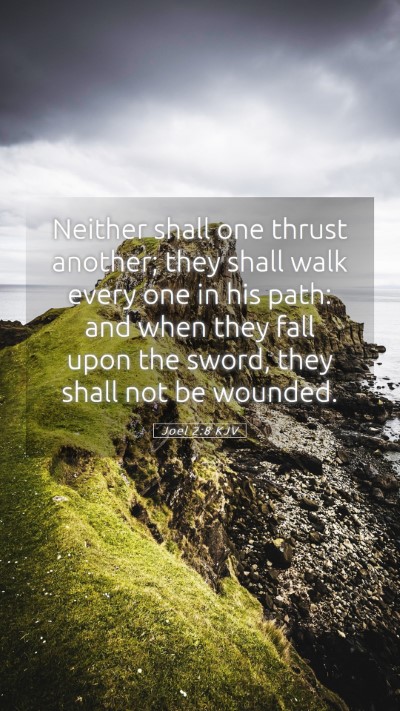Bible Verse Meaning: Joel 2:8
Introduction
Joel 2:8 is a verse that presents vivid imagery and context within the prophetic book of Joel, emphasizing the nature of an invading force. This verse requires a thoughtful exploration to grasp its meanings and implications. Through the lenses of public domain commentaries, we will delve into a comprehensive understanding that can benefit those seeking Bible verse meanings and Bible verse interpretations.
Verse Context and Content
Scriptural Text:
"Neither shall one thrust another; they shall walk every one in his path: and when they fall upon the sword, they shall not be wounded." (Joel 2:8 KJV)
Summary of Biblical Exegesis
In this verse, Joel depicts a scene of an unstoppable force, illustrating both the might and the coordinated nature of this invasion. The emphasis on how they “shall walk every one in his path” indicates a disciplined and united front that suggests tactical prowess. The mention of being unharmed by swords demonstrates the invulnerability and divine backing that this army seemingly possesses.
Insights from Notable Commentaries
-
Matthew Henry
Henry explains that this verse symbolically represents the locust plague, which serves as a judgment from God. He interprets their ability to advance without injury as a representation of their destructive power, which yields no personal loss. This imagery stresses the inevitability and severity of divine judgment upon the people for their transgressions.
-
Albert Barnes
Barnes emphasizes the precision and unity of the locusts as a metaphor for the divine army, indicating that their disciplined advance signifies both physical and spiritual tumult caused by God’s wrath against sin. He sees the non-injury from swords as a further reflection of divine providence and the protective hand of God over His judgment.
-
Adam Clarke
Clarke reflects on the ominous nature of this verse, urging readers to recognize the grave importance of heedfulness in spiritual life. He connects the locusts' organized approach with the structure of judgment that God employs to correct His people, pointing out the profound weight this imagery carries in terms of both literal and spiritual interpretations.
Understanding Bible Verse Interpretations
Understanding Joel 2:8 in the light of the historical context of judgment upon Israel offers insights into the nature of God's relationship with His people. Here are some key themes and applications:
- Divine Judgment: The verse serves as a warning about the consequences of turning away from God and the inevitability of divine judgment.
- Unity in Tragedy: The organization of locusts reflects how adversity can unite individuals, drawing a parallel to the communal spiritual struggles faced by the people.
- Spiritual Warfare: This verse is often interpreted within the context of spiritual battles that believers face, where understanding the nature of opposition is crucial.
Application of the Verse
Applying the insights from this scripture within the day-to-day lives of believers can assist in spiritual fortification against judgment and adversity:
- Reflection: Contemplate your spiritual walk and alignment with God's will.
- Community Support: Acknowledge the importance of a united community in the face of spiritual battles.
- Awareness of Divine Oversight: Recognize God's protective and judgemental attributes in your life experiences.
Cross References
For deeper exploration into the themes within Joel 2:8, consider these related verses:
- Jeremiah 5:6: Highlights the predatory nature of a judgmental force.
- Revelation 9:3: Speaks of a similar plague of locusts as a judgment during the end times.
- Isaiah 47:12-14: Discusses judgment upon a proud nation.
Conclusion
Joel 2:8 serves as a vivid illustration of divine judgment and the characteristics of the Lord's intervention in human affairs. This verse calls for self-examination and stresses the importance of understanding the sacred relationship between God and His people. Employing insights from various commentaries enriches our Bible study insights and offers profound Bible verse explanations that can be integral for both personal and community spiritual growth.
Additional Study Resources:
- Online Bible study groups for collaborative learning.
- Access to Bible study tools and guides for deeper understanding.
- Courses focused on Old Testament prophecy interpretations.


